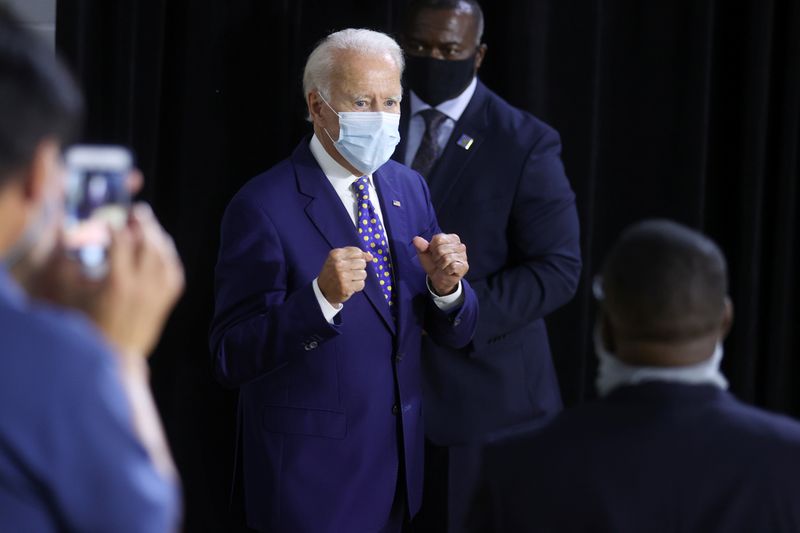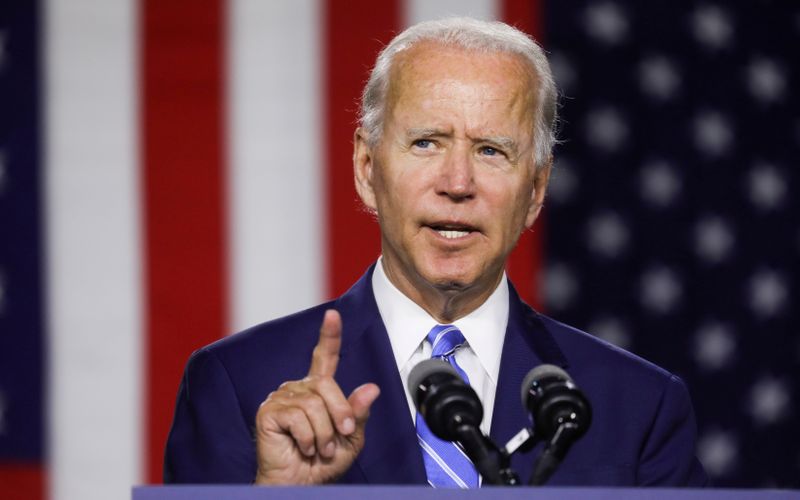By Trevor Hunnicutt
WILMINGTON, Del. (Reuters) - U.S. presidential candidate Joe Biden promised on Tuesday to fight the outsized economic burdens of nonwhite families with billions of dollars in federal spending for minority-owned businesses and provisions for more affordable housing.
The Democrat, who faces Republican President Donald Trump in the Nov. 3 presidential election, announced the proposal as the fourth and final plank of a plan to revitalize the coronavirus-hit U.S. economy.
Speaking in his hometown of Wilmington, Delaware, Biden, who leads Trump in national polls, invoked the name of U.S. Representative John Lewis, the Black civil rights hero who died of cancer 10 days ago.
When the two men spoke recently, the dying Lewis waved off concerns about his own health, Biden said. "He asked that we stay focused on the work left undone to heal this nation."
The former vice president assailed Trump for his responses to the pandemic and U.S. protests over racial inequity. He accused Trump of deploying federal agents to quell unrest in Portland, Oregon, as a political tactic to stoke division and rescue what he called a failing campaign.
"Donald Trump fails the basic threshold test of being president - the duty to care about the entire country, not just his re-election prospects," Biden, 77, said.
Trump, 74, has defended his actions against protesters as necessary to stop criminals intent on violence.
In a statement responding to Biden's plan, Trump campaign senior adviser Katrina Pierson cited as achievements for Black Americans both criminal justice reform and record low unemployment before the pandemic under Trump.
$150 BILLION
Biden's overarching economic plan includes investing trillions of dollars in manufacturing and innovation, clean energy and childcare. Republican critics have said the plans will lead to higher taxes.
The campaign has not detailed how it would pay for every proposal, though it has said raising taxes on corporations and the wealthy would cover much of the cost.
Tuesday's speech sought to outline how Biden would place racial justice at the center of his economic politics.
Biden has resisted calls from some in his own party for more aggressive measures to erase the sizable racial wealth gap, such as reparations for descendants of Black slaves and "baby bonds" providing every child a government-sponsored investment account. He has said he supports studying such initiatives further.
His plan would put $30 billion into a new small business opportunity fund. The investment would leverage $5 in private investment for every $1 of public money, the campaign estimated.
In total, the campaign said, the plan would provide $50 billion in public-private venture capital and another $100 billion in low-interest business loans for mostly minority-owned businesses that historically have struggled.
Biden proposed requiring the Federal Reserve to report regularly on what it is doing to address racial economic inequality.
The proposal includes a housing tax credit of up to $15,000 for low- and middle-class families.
Biden spoke at a community center for children in majority-Black central Wilmington, where the unemployment rate has more than trebled this year.

Biden, who said on Tuesday he plans to name a running mate in the first week of August, has been under increasing pressure to pick a Black woman in the face of months of protest following the police killing of George Floyd, a Black man in Minnesota.
